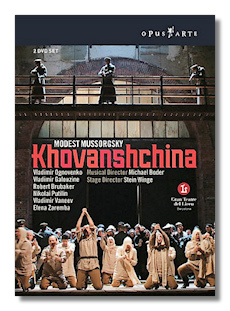
The Internet's Premier Classical Music Source
Related Links
- Mussorgsky Reviews
- Latest Reviews
- More Reviews
-
By Composer
-
Collections
DVD & Blu-ray
Books
Concert Reviews
Articles/Interviews
Software
Audio
Search Amazon
Recommended Links
Site News
 DVD Review
DVD Review
Modest Mussorgsky

Khovanshchina
- Vladimir Vaneev (Dosifey)
- Vladimir Ognovenko (Prince Ivan Khovansky)
- Vladimir Galouzine (Prince Andrei Khovansky)
- Elena Zaremba (Marfa)
- Robert Brubaker (Prince Vasily Golitsyn)
- Nikolai Putilin (Shaklovity)
- Graham Clark (Scribe)
- Nataliya Tymchenko (Emma)
Chorus of the Gran Teatre del Liceu
Gran Teatre del Liceu Symphony Orchestra/Michael Boder
Opus Arte OA0989D 2DVDs 192:00 LPCM stereo DTS Widescreen Anamorphic
As most of his admirers are aware, Mussorgsky started more operas than he finished. Khovanshchina was left incomplete by the composer at his death in 1881, and then Rimsky-Korsakov fashioned a version of the work, the first composer to do so. There were later versions, including a collaborative one by Ravel and Stravinsky, and one by Russian musicologist Pavel Alexandrovich Lamm. But it is the Shostakovich version (1939-40), drawn on the Lamm completion, that is presented here and is now generally viewed as the best of the several major completions. Rightly so.
Shostakovich cannot resist putting a few touches uniquely his own in the orchestration, but who can blame him? Liszt generally managed to put his imprint on his piano transcriptions, not to mention his paraphrases and fantasies. So the scoring sounds mostly like Mussorgsky, but with hints throughout – sometimes big hints – of Shostakovich. In the end, this must be assessed an excellent rendition of this problematic opera, a work whose music is as strong – maybe stronger – than Boris Godunov's, but whose sometimes incoherent libretto has sabotaged the end product. For purposes of this review I must state there are just too many issues to cover here regarding the various shortcomings in the opera and its several versions, which were all sincere attempts to capture the best in the music and libretto, wrongheaded though the smoothed-over Rimsky-Korsakov version was. Thus, I will limit myself to the merits of this Opus Arte recording.
First of all, the production is reasonably good, capturing the dark mood of the work, not updating or modernizing it in some controversial way, as happens with so many operas today. Costuming and sets are all well conceived, imparting an authentic sense to the proceedings. The singers are generally strong here: I especially liked Robert Brubaker's Prince Golitsyn, and both Vladimir Ognovenko and Vladimir Galouzine turn in fine work as well. Elena Zaremba begins a little shakily but gets stronger as the opera proceeds, overall coming across as a quite convincing Marfa. She sounds better, however, in her upper ranges, displaying a bit of wobble at the lower end.
Michael Boder draws fine performances from both the orchestra and chorus of the Gran Teatre del Liceu. There are some cuts here: scenes with the pastor and Susanna have been eliminated. But these are minor excisions and arguably strengthen the opera. The sound is excellent and the camera work intelligently executed. This is a major production of an important, if flawed masterwork by Mussorgsky.
Copyright © 2008, Robert Cummings





















